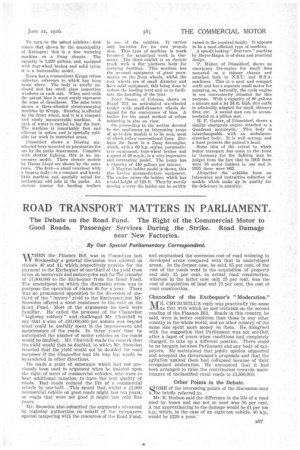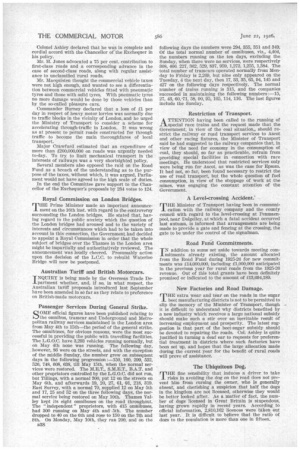ROAD TRANSPORT MATTERS IN PARLIAMENT.
Page 21

Page 22

If you've noticed an error in this article please click here to report it so we can fix it.
The Debate on the Road Fund. The Right of the Commercial Motor to Good Roads. Passenger Services During ,the Strike. Road Damage near New Factories.
By Our Special Parliamentary Correspondent.
HEN, the Finance •Bill was in. Committee last.
-Wednesday a' general diseussion was allowed on clauses 40. and 41, which respectively provide for the payment to the Exchequer of one-third of the yield from taxes on motorcars and-motorcycles and forThe transferof £7,000,000 to the Exchequer from the Road Fund. The amendment.on which the discussion arose was to postpone the operation Of clause 40 for a year. There was no pronounced opposition to the diversion of onethird of the " luXury " yield to, the Exchequer, but Mr. Snowden offered a stout,resistance. to the raid on the RoadFund., Most of the arguments he used were He Called the proposalof the Chancellor " highwn.y robbery " and challenged Mr. Churchill to say that a" sum of £20,000,000 per annum was beyondwhat -could be UsefUlly-'sPent in the improvement and maintenance of the roads. In three years' time he anticipated the number of motor vehicles on the roads would be dotirded. Mr. Chtirchill made the remark that the yield would then be dOubled, to Which Mr. Snowden retorted that the yield would not be doubled for road purposes if. the Chancellor had his way but would be squandered in other directions.
He made a point of substance which had not previously been used in argument when he insisted upon the right of users of commercial vehicles, who were to bear additional taxation, to have the best quality of roads. Bad roads reduced the life of a commercial vehicle by one-half. , This meant that, whilst a £1,000 commercial vehicle on good roads might last ten years, on roads that were not good it might last only five years. • Mr. Snowden also submitted the arguments advanced by ,highway authorities on behalf of the ratepayers against tampering with the resources of the Road Fund,
and emphasized the enormous cost of road widening in developed areas compared with that in undeveloped areas. In the former case, he said, 85 per cent, of the cost of the roads went in the acquisition of property and only 15 per cent. in actual road construction, whereas in the latter case only 25 per cent, was the cost of acquisition of land and 75 per cent, the cost of road construction.
Chancellor of the Exchequer's "Moderation."
VTR. CHURCHILL'S reply was practically the same that with which he met criticism on the second reading of the Finance Bill. Roads in this country, he said, were in better condition than those in any other country in the whole world, and no other country of the same size spent more money on them. He disagreed with the suggestion that Parliament was not entitled, after a lapse of years when conditions had completely changed, to take up a different position. There could be no bargain hetWeen Parliament and any body of taxpayers. He maintained that public opinion supported and accepted the Government's proposals and that the agitation against them had collapsed because of their recognized moderation. He announced that it had been arranged to raise the contribution towards maintenance of unclassified rural roads to £1,300,000.
Other Points in the Debate.
SOME of the interesting points of the discussion may be briefly referred to. Mr. R. Hudson said the difference in the life Of a road uSed by buses and one not so used was 50 per cent. A tax approximating to the damage would ben per ton h.p„ which, in the case of an eight-ton vehicle, 40 h.p., would be £320 a year.'
Colonel Ashley declared that he was in complete and cordial accord with the Chancellor of Exchequer in his policy.
Mr. H. Jones advocated a 75 per cent, contribution to first-class roads and a corresponding advance in the case of second-class roads, along with regular assistance to unclassified rural roads.
Mr. Macquisten thought the commercial vehicle taxes were not high enough, and wanted to see a differentiation between commercial vehicles fitted with pneumatic tyres and those with solid tyres. With pneumatic tyres no more damage would be done by those vehicles than by the so-called pleasure cars.
Commander Burney declared that a loss of £1 per day in respect of heavy motor lorries was normally due to traffic blocks in the vicinity of London, and he urged the Ministry of Transport to consider a scheme for accelerating through-traffic in London. It was wrong as at present to permit roads constructed for through traffic to become the main thoroughfares of local transport, Major Crawfurd estimated that an expenditure of more than £200,000,000 on roads was urgently needed to-day. To try to limit mechanical transport in the interests of railways was a very shortsighted policy. Several members also opposed the raid on the Road Fund as a breach of the understanding as to the purpose of the taxes, without which, it was argued, Parliament would not have agreed to the high scale of duties. In the end the Committee gave support to the Chancellor of the Exchequer's proposals by 234 votes to 124.
Royal Commission on London Bridges.
THE Prime Minister made an important announcement on the 16th inst. with regard to the controversy surrounding the London bridges. He stated that, having regard to the public anxiety which the question of the London bridges had aroused and to the variety of interests and circumstances which had to be taken into account in this connection, the Government had decided to appoint a Royal Commission in order that the whole subject of bridges over the Thames in the London area might be impartially and authoritatively reviewed. The announcement was loudly cheered, Presumably action upon the decision of the L.C.C. to rebuild Waterloo Bridge will now be postponed.
Australian Tariff and British Motorcars.
INQUIRY is being made by the Overseas Trade Department whether, and, if so, in what respect, the Australian tariff proposals introduced last September have been amended in so far as they relate to preference on l3ritish-made motorcars.
Passenger Services During General Strike.
OME official figures have been published relating to the omnibus, tramcar and Underground and Metropolitan railway services maintained in the London area from May 4th to 15th-the period of the general strike. The omnibuses, for obvious reasons, were the most sue • cessful in providing the public with travelling facilities. The L.G.O.C. have 3,293 vehicles running normally, but on May 4th none was running. The following day, however, 86 were on the streets, and with the exception of the middle Sunday, the number grew on subsequent days in the following progression :-150, 160, 299, 532, 526, 748, 608, 638, till May 15th, when the normal services were restored. The M.E.T., S.M.E.T., B.A.T. and other proprietors controlled by the L.G.O.C. did not run, but Tillings, with a normal 300, put 12 on the streets on May 6th, and afterwards 19, 20, 27, 61, 91, 218, 319. East Surrey, with a normal 70, supplied 12 on May 5th and 17, 25 and 52 on the three following days, the normal service being restored on May 10th, Thames Valley kept its eight omnibuses on the road throughout. The " independent " proprietors, with 415 omnibuses, had 300 running on May 4th and 5th, The number dropped to 40 on the 6th and rose to 150 on the 7th and 8th. On Monday, May 10th, they ran 200, and on the e38 following days the numbers were 294, 355, 351 and 349. Of the total normal number of omnibuses, viz., 4,404, the numbers running on the ten days, excluding the Sunday, when there were no services, were respectively 308, 406 227, 362, 529, 837, 959, 1,272, 1,255, 1,384. The total number of tramcars operated normally from Monday to Friday is 2,269, but nine only appeared on the Tuesday, 4 the next day, then 17, 33, 35, 65, 94, 145 and 427 on the following days respectively. The normal number of trains running is 315, and the companies 'succeeded in maintaining the following numbers :-15, 27, 43, 60,11, 58, 90, 95, 105, 114, 116. The last figures include the Sunday.
Restriction of Transport.
ATTENTION having been called to the running of special race trains and the request.made that the Government, in view of the coal situation„ should restrict the railway or road transport services to Ascot and other racing fixtures, the Minister of Transport said he had suggested to the railway companies that, in view of the need for economy in the consumption of coal, they should, so far as practicable, refrain from providing special facilities in connection with race meetings. He understood that restricted services only were being run for Ascot, as was the case for Epsom. It had not, so far, been found necessary to restrict the use of road transport, but the whole question of fuel consumption, in view of the stoppage of work at the mines, was engaging the constant attention of the Government.
A Level-crossing Accident.'
THE Minister of Transport having been in communication with the railway company and the county council with regard to the level-crossing at Penmaenpool, near Dolgelley, at which a fatal accident occurred last autumn, is informed that arrangements are being made to provide a gate and fencing at the crossing, the gate to be under the control of the signalman.
Road Fund Commitments.
IN addition to sums set aside towards meeting cornmitments already existing, the amount allocated from the Road Fund during 1925-26 for new commitments was £14,000,000, including £1,000,000 anticipated in the previous year for rural roads from the 1925-26 revenue. Out of this total grants have been definitely promised or indicated to the amount of £13,694,189.
New Factories and Road Damage.
THE extra wear and tear on the roads in the sugar beet manufacturing districts is not to be permitted to slip the memory of the Minister of Transport, though it is difficult to understand why districts benefited by a new industry which receives a large national subsidy should make such a stir over an inevitable result of increasing employment and prosperity. The latest suggestion is that part of the beet-sugar subsidy should be devoted to repairing the roads. Col. Ashley is quite justified in turning a deaf ear to requests for preferential treatment in districts where such factories have been set up, and hopes that the large allocation made during the current year for the benefit of rural roads will prove of assistance.
The Ubiquitous Dog.
THE tine sensibility that induces a driver to take risks in avoiding the dog on the road does not prevent him from cursing . the owner, who is generally absent, and cherishing a suspicion that half the dogs in the kingdom are not licensed, otherwise they would be better looked after. As a matter of fact, the number of dogs licensed in Great Britain is stupendous, having grown rapidly in recent years. According, to official information, 2,810,162 licences were taken out last year. It is difficult to believe that the ratio of dogs to the population is more than one in fifteen.






























